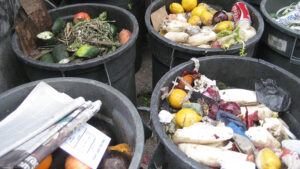This talk is available via Zoom. Registration is required. Please complete the registration form to receive the Zoom connection information.
 Speakers: Jean MacRae, Civil & Environmental Engineering, UMaine; Cynthia Isenhour, Anthropology, UMaine
Speakers: Jean MacRae, Civil & Environmental Engineering, UMaine; Cynthia Isenhour, Anthropology, UMaine
Great strides have been made in New England to move toward a more circular food system. Some states have banned food waste from landfills, reducing methane and leachate production, and stimulating new economic opportunities by producing heat, electricity and useful soil conditioners (compost and digestate) from food scraps. While these efforts are positive, we need to be careful to ensure the new systems don’t introduce contamination risks into our food system. In this presentation we will describe the results of a study on contamination of food waste from a variety of sources and a survey of food scrap processors. We discuss how the perceived and measured risks lined up and these new food waste processing systems add up when thinking about sustainability and safety.
Jean MacRae is an environmental microbiologist and environmental engineering faculty member in UMaine’s Department of Civil and Environmental Engineering. In addition to teaching environmental engineering topics such as introductory environmental engineering, wastewater treatment, air pollution and solid waste management, she does research on biological remediation and the roles of microbes in nutrient (mostly nitrogen) and element (arsenic, uranium, iron and sulfur) cycling.
Cynthia Isenhour is an ecological and economic anthropologist. She serves as an Associate Professor in UMaine’s Department of Anthropology and the Climate Change Institute. Her research focuses on how history, culture and power shape environmental governance and policy. Recognizing that improvements in energy and natural resource efficiencies are quickly being undone by rising levels of consumption, Isenhour’s recent work looks at policies and alternative economic institutions designed to encourage more sustainable behaviors, primarily among the world’s most affluent consumers. Isenhour is currently working on a project designed to measure the contribution of Maine’s reuse economies to the reduction of materials throughout, energy use, emissions and waste. This project also looks at the sector’s contribution to local economies and the accumulation of social capital and adaptive capacity.

